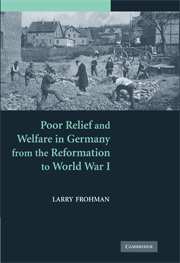Book contents
- Frontmatter
- Contents
- List of Tables and Figure
- Acknowledgments
- Introduction
- 1 Discipline, Community, and the Sixteenth-Century Origins of Modern Poor Relief
- 2 The Rise and Fall of the Workhouse: Poor Relief in the Age of Absolutism
- 3 Pauperism, Moral Reform, and Visions of Civil Society, 1800–1870
- 4 The State, the Market, and the Organization of Poor Relief, 1830–1870
- 5 The Assistantial Double Helix: Poor Relief, Social Insurance, and the Political Economy of Poor Law Reform
- 6 New Voices: Citizenship, Social Reform, and the Origins of Modern Social Work in Imperial Germany
- 7 The Social Perspective on Poverty and the Origins of Modern Social Welfare
- 8 From Fault to Risk: Changing Strategies of Assistance to the Jobless in Imperial Germany
- 9 Youth Welfare and the Political Alchemy of Juvenile Justice
- 10 The Social Evolution of Poor Relief, the Crisis of Voluntarism, and the Limits of Progressive Social Reform
- 11 Family, Welfare, and (Dis)order on the Home Front
- 12 Wartime Youth Welfare and the Progressive Refiguring of the Social Contract
- Conclusion: The End of Poor Relief and the Invention of Welfare
- Sources and Abbreviations
- Index
- References
Introduction
Published online by Cambridge University Press: 17 July 2009
- Frontmatter
- Contents
- List of Tables and Figure
- Acknowledgments
- Introduction
- 1 Discipline, Community, and the Sixteenth-Century Origins of Modern Poor Relief
- 2 The Rise and Fall of the Workhouse: Poor Relief in the Age of Absolutism
- 3 Pauperism, Moral Reform, and Visions of Civil Society, 1800–1870
- 4 The State, the Market, and the Organization of Poor Relief, 1830–1870
- 5 The Assistantial Double Helix: Poor Relief, Social Insurance, and the Political Economy of Poor Law Reform
- 6 New Voices: Citizenship, Social Reform, and the Origins of Modern Social Work in Imperial Germany
- 7 The Social Perspective on Poverty and the Origins of Modern Social Welfare
- 8 From Fault to Risk: Changing Strategies of Assistance to the Jobless in Imperial Germany
- 9 Youth Welfare and the Political Alchemy of Juvenile Justice
- 10 The Social Evolution of Poor Relief, the Crisis of Voluntarism, and the Limits of Progressive Social Reform
- 11 Family, Welfare, and (Dis)order on the Home Front
- 12 Wartime Youth Welfare and the Progressive Refiguring of the Social Contract
- Conclusion: The End of Poor Relief and the Invention of Welfare
- Sources and Abbreviations
- Index
- References
Summary
Poor relief and charity have often struggled to find their historiographical voice. On the one hand, their history has often been written, especially by their practitioners and advocates, either as an expression of Christian brotherly love or as a manifestation of a primal form of human interaction. On the other hand, the triumph of social insurance has given the modern social state a powerful telos that privileges the rise of state-centered social insurance and social policy programs while marginalizing all those earlier institutions and strategies for assisting the needy that cannot be incorporated into the narrative prehistory of these programs, their subsequent development, or the specific vision of modernity implicit in them. However, since the 1990s those forms of assistance to the needy that were repressed in earlier narratives of the social state have returned with a vengeance from the periphery to the center of scholarly interest, and with the rise of the new social history – and, more recently, the cultural turn – this historical backwater has become a privileged site of inquiry for historians and social theorists interested in social discipline, gender, civil society, modernity, and state-formation.
The master concept in the recent literature on poor relief, charity, and welfare has been social discipline, and any study of the topic has to come to terms with this body of work.
- Type
- Chapter
- Information
- Publisher: Cambridge University PressPrint publication year: 2008



